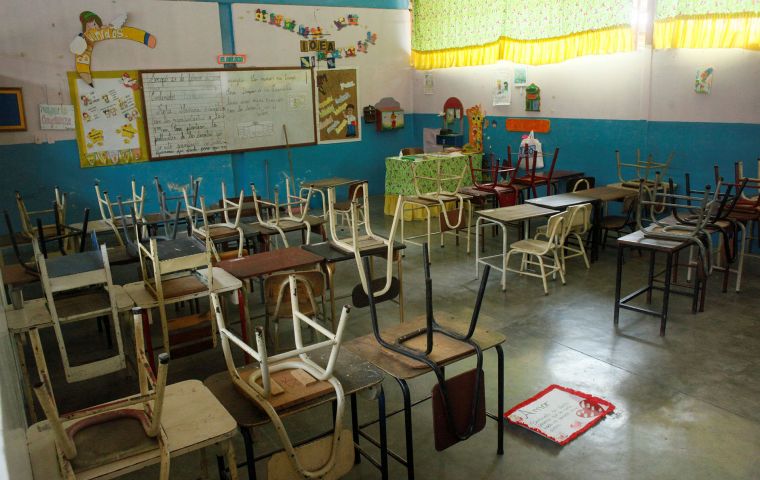MercoPress. South Atlantic News Agency
Venezuelan children return to school after 19 months
 Children had to wait 19 months to go back to schools without electricity or water
Children had to wait 19 months to go back to schools without electricity or water Over 11 million Venezuelan pupils have returned to their schools Monday after a 19-month pause due to COVID-19. The Government had delayed the restart of on-site schooling several times, amid recurrent peaks in infections in addition to vaccination delays.
“With joy, enthusiasm and responsibility our children and young people return to face-to-face classes, always respecting biosecurity measures,” President Nicolás Maduro said Monday on Twitter. “Let’s preserve health to build the new normal.”
Some 8.7 million children were due to return to classrooms across the country and some 3.1 million students would resume attending universities, according to Youth Minister Mervin Maldonado. But
about only 40% of his school’s 1,700 registered students did, community representative Pedro Zambrano told the media.
In addition to children, there were also teachers harbouring doubts about the return to school. “For us, the return to classes is important, but we have doubts,” said Maria Clemente, an official at the Venezuelan Federation of Teachers, which has some 325,000 members. Some teachers will remain absent for fear of getting sick or because of low salaries, she said, adding that the maximum monthly salary was B$ 118 (US $ 27)
Since the pandemic began, Venezuela has recorded more than 400,000 coronavirus cases and more than 4,800 deaths, according to Johns Hopkins University in the US, which also claimed less than 22 % of Venezuelans were fully vaccinated, against the Government's claim that 56% of Venezuela's 28.7 million were. Children aged 12 and up are now eligible for their first dose of a COVID-19 vaccine in the country.
Venezuela is administering Russia''s Sputnik V and China's Sinopharm two-dose immunizers. Not so long ago, it also began using Cuba's Abdala, which requires three doses for a full immunization cycle.
Opposition leader Marco Aurelio Quiñones was against the return to schools citing infrastructure deficiencies. “It is not a matter of a decree, it goes through a series of conditions that today are non-existent. Without electricity, without water, with vandalized schools, poorly paid teachers and insufficient public transport, the beginning of face-to-face classes is a complicated task,“ Quiñones wrote on Twitter.
He added these ”difficulties do not include the biosecurity measures that must be implemented in each educational centre.“ In his view, education authorities “had more than a year to recover schools and design the strategy for the application of a strict sanitary protocol,” which did not happen because for those responsible “the priority is corruption.”




Top Comments
Disclaimer & comment rulesCommenting for this story is now closed.
If you have a Facebook account, become a fan and comment on our Facebook Page!